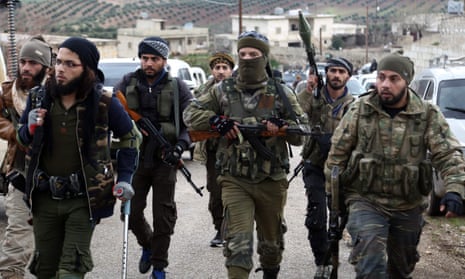Turkey claims to have encircled Afrin in northern Syria, besieging up to 200,000 civilians, many of whom were attempting to flee what they fear will be an imminent blockade and bombardment of the majority Kurdish city.
Queues of anxious families stretching for several hundred metres streamed towards the last remaining exit in the city’s south on Friday, as the Turkish military and members of an Arab proxy force, which it mobilised seven weeks ago, consolidated positions they had gradually taken since Monday.
The advances marked a significant moment in more than two months of clashes between Kurdish groups and Turkish-led forces and raised fresh questions about Ankara’s plans for the ethnically mixed area, which has rapidly become a focal point of Syria’s civil war and an exemplar of tensions between Arabs, Turks and Kurds more generally.
Turkey’s gains also continue to showcase friction between Ankara and Washington, which has used Kurdish groups as proxies to fight Islamic State in north-east Syria must to the chagrin of Turkish leaders. The US has not intervened since the campaign began on 20 January, claiming it was committed to the defence of its allies only in areas in which it had a presence.
Many of those fleeing on Friday were Kurdish families who feared they would not be allowed to return and that Arab families would be moved into their neighbourhoods in a campaign orchestrated by Ankara to permanently drive Kurdish militant groups from Turkey’s south-west border.
At the outset of the military operation, the Turkish president, Recep Tayyip Erdoğan, said: “Turkey’s aim is to give Afrin back to its rightful owners” – a statement that has since been used by Kurdish groups to claim he intends to engineer a demographic shift. However, Turkish military jets dropped fliers over Afrin on Friday that claimed the incursion was aimed only at forcing militants allied to the YPG militia to flee the area.
“We are here for your peace and security; trust in Turkey’s justice. Please don’t believe terrorists’ empty promises. YPG/PKK terrorist leaders are fleeing Afrin and living good lives elsewhere. Please stay away from the bloody terror organisation. Take our hands, please surrender. A good future with peace awaits you in Afrin,” said one flyer also referring to Kurdish Worker’s party, or PKK, which is listed as terrorist group by Nato, the US and the EU among others.
Among members of the YPG and an affiliated group, the US-backed Syrian Democratic Forces (SDF), there appeared to be no takers. “The Turks are taking over a land that isn’t theirs,” said a SDF spokesman. “They are attempting a demographic change – they are trying to blackmail the EU with the refugee problem.”
He said Afrin had been a refuge to those fleeing from elsewhere in Syria throughout the war. “There are Arabs, Yazidis, Alawites and Christians. People must be careful about not making this seem like an Arab v Kurdish conflict. Most people are fleeing towards regime-held territories like Aleppo.”
The United Nations said on Friday the influx of exiles into regime-controlled areas was overwhelming the already stretched capacity of local communities.
“Thousands of people are running, basically running, going up mountainous slopes away from the Turkish incursion,” said the UN’s humanitarian coordinator, Ali al-Zaatari. “People are living in forests and going to different villages. They are leaving with their minimal stuff that they can take out, so we have a crisis breeding a crisis, and all people need help, both those hosting the IDPs [internally displaced people] and the IDPs themselves.”
Families fleeing, and residents who have remained in Afrin, claimed that militants were attempting to slow the flow of people leaving. “Kurds and Arabs are trying to leave Afrin but it’s been difficult,” said Khaled al-Harbi, an Arab student.
“The Kurdish militias are not allowing them to leave. The regime has facilitated ways for fleeing but everybody I have been speaking to wish they never left with them. They’ve been mistreated by the regime militias. The Kurds naturally hate the Turks, even before the Afrin operation. They cannot live with them, or tolerate them.”
Hareth Rabbah, 24, from Afrin, said: “The Arabs aren’t happy to see the Kurds go, on the contrary, we know that not all Kurds are affiliated with militias. Just as they understood not all Arabs are affiliated with armed jihadist groups like Isis.
“The regime has been opening corridors for people to flee but Kurdish militias have been disrupting the evacuation and using the civilians as human shields.”
Rabbah, who said he supported the Turkish incursion, added: “Afrin is an Arab Syrian land and always will be.”
Turkish officials said this week that Afrin would not be returned to the control of the Assad government, suggesting it intended to use the area as a new cornerstone of its influence in northern Syria.
Ankara last year established a zone of control further to the east of Afrin in the towns of Jarabulus, Manbij and al-Bab, which are loosely demarcated by the Euphrates river. The 60-mile (95km) gap between Afrin and Jarabulus is the only part of the 511-mile border in which Kurdish populations do not have a presence.
Turkey has remained adamant through the Syrian war, in its eighth year, that Kurds would not use the chaos to close the gap. Syrian Kurdish militants are closely linked to the PKK, which has fought a four-decade insurgency against the Turkish state.
Some senior members of the ruling party in Ankara have repeatedly urged Erdoğan to try to seize Afrin and move Kurds in north-west Syria further away from the border and diminish what they see as a PKK consolidation amid the ruins of the conflict.
Additional reporting by Nadia al-Faour
